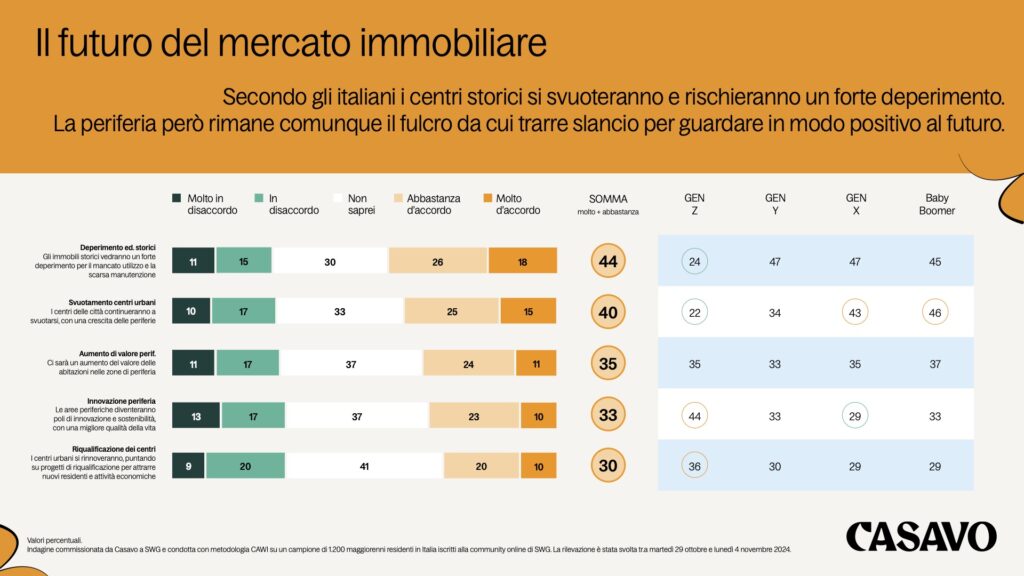Index
- According to a Casavo survey, 1 in 3 Italians says they are witnessing a recovery following the crisis of recent years
- 35% expect an increase in the value of homes in the suburbs and 33% identify these areas as future hubs of innovation and sustainability
- Resolving the difficulties of accessing credit for young people and families is among the priorities for the near future (35%)
Milan, 4 December 2024 - In Italy, a home is seen as a safe investment and a symbol of stability, which is why buying a property is a priority for many families. However, in recent years there has been growing uncertainty linked to prices often considered too high compared to the average income, especially in large cities.
Casavo (https://casavo.com/it/), a company that offers smart solutions for selling and buying homes, wanted to investigate how Italians perceive the current real estate sector and what their expectations are for 2025.
[cta-casavo title="Sell your home. Fixed commissions at 1%." text="The valuation is instant and free."]
The results of the research commissioned by SWG reveal that Italians are substantially optimistic about the current situation: 32% think that the real estate market has experienced a period of crisis and is slowly recovering, while 13% believe it is in the midst of a phase of rebirth and redevelopment. This optimism, however, appears to vary based on when respondents first had a buying or selling experience. Those who purchased a home 5-10 years ago, in fact, are more confident in the market's recovery (56%), likely because they were able to benefit from more favorable conditions, such as lower interest rates and relatively stable prices. Among those who purchased a home in the last year, however, confidence drops to 39%, a sign that they have had to face a more challenging market characterized by rising prices per square meter and increasing difficulties in accessing or sustaining a mortgage, a direct consequence of more restrictive monetary policies. inflation and rising interest rates.
This difference highlights how macroeconomic changes in recent years have affected the perception of the real estate market, creating a more complex environment for those now approaching home purchases.
Compared to the market in 2025, Italians are more cautious, reflecting a period of great global economic uncertainty. 45% of respondents expect the real estate market to be substantially stable for next year, a figure that seems to reflect a desire for normalization after years of turbulence amid the pandemic, energy crisis, and geopolitical instability. However, one in three Italians believes the situation could worsen, underscoring concerns once again linked to the possibility of a recession of the market in 2025. new increase in interest rates and further growth in inflation, which continue to erode the purchasing power of families.
Redevelopment projects in the city center, increase in value in the suburbs
According to respondents, historic buildings will see a deterioration (44%) while city centers will continue to empty in favor of the suburbs (40%). Despite this, a third of the population (30%) remains positive and thinks that city centers will be renewed, focusing on redevelopment projects to attract new residents and economic activities.
The suburbs remain the fulcrum from which to draw momentum to look positively to the future. 35% of respondents expect an increase in the value of homes, and 33% expect these areas to become hubs of innovation and sustainability, ensuring a better quality of life.
Challenges and opportunities: difficulty accessing credit and sustainable redevelopment
The greatest fear for the near future will be the difficulty of accessing credit for young people and families, according to 35% of those interviewed, with a peak reaching 40% among Gen Z. This challenge is felt more in Rome (53%) than in Milan (39%).
This is followed by the need to redevelop obsolete real estate assets. (23%), the increase in the cost of raw materials (18%), the increase in interest rates (14%) and, lastly, the uncertainties linked to intermittent government policies (10%).
On the opportunity front, the need to transform existing real estate assets emerges strongly: in first place, interviewees confirm the redevelopment of urban and peripheral areas (39%), followed by the greater attention to sustainability and energy efficiency (37%), the development of new housing models that respond to emerging needs (14%) and technological innovation in the buying and selling process (10%).
The real estate sector reflects the profound changes in our society more than others. In Italy, a home is not just an investment, but a cultural pillar that represents security and stability. However, the difficulties in accessing credit, especially for young people, and the obsolescence of part of the real estate assets remind us that the sector needs to renew itself,” comments Victor Ranieri, Chief Revenue Officer of Casavo. “The data show us a country that, despite uncertainties, sees the suburbs and urban redevelopment as two great opportunities to create value and improve people's quality of life. It is on this basis that we at Casavo intend to continue to innovate the sector to make it less complex and provide a quality service that truly brings transparency, convenience, and support to the consumer.” [cta-casavo title="Overwhelmed by documents?" text="Don't worry, Casavo handles the bureaucratic part for you."]

